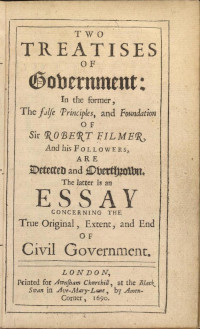Web Pages
Module 2: John Locke's Two Treatises of Government
Second module of the Cato Home Study Course, includes link to listen or download audio program (2:41:50), questions and suggested readings
Suggested Additional Reading
John Locke, Two Treatises of Government. Although a variety of editions of this classic work are available, the most highly recommended is the one edited by Peter Laslett, which provides useful notes and an introduction. The Second Treatise is well worth reading in its entirety, both to appreciate the logic of its arguments and to experience for oneself the rigor of Locke's libertarian, or Whig, arguments for liberty.
Articles
John Locke, by William Uzgalis,
Stanford Encyclopedia of Philosophy, 7 Jul 2022
Major sections: Historical Background and Locke's Life - The Limits of Human Understanding - Locke's Major Works on Education - The
Two Treatises Of Government - Locke and Religious Toleration - Bibliography - Other Internet Resources
The Two Treatises of Government were published in 1689, long after the rebellion plotted by the Country party leaders had failed to materialize and after Shaftsbury had fled the country for Holland and died. The introduction of the Two Treatises was written after the Glorious Revolution of 1688, and gave the impression that the book was written to justify the Glorious Revolution. We now know that the Two Treatises of Government were written during the Exclusion crisis in 1681 and may have been intended in part to justify the general armed rising which the Country Party leaders were planning.
John Locke—Natural Rights to Life, Liberty, and Property, by
Jim Powell,
The Freeman, Aug 1996
Extensive biographical essay, including summaries of his major works
Locke worked in his bookshelf-lined room at Shaftesbury's Exeter House, drawing on his experience with political action. He wrote one treatise which attacked Filmer's doctrine. Locke denied Filmer's claim that the Bible sanctioned tyrants and that parents had absolute authority over children. Locke wrote a second treatise, which presented an epic case for liberty and the right of people to rebel against tyrants. While he drew his principles substantially from [James] Tyrrell, he pushed them to their radical conclusions: namely, an explicit attack on slavery and defense of revolution.
Locke, John (1632-1704), by
Eric Mack,
The Encyclopedia of Libertarianism, 15 Aug 2008
Biographical and bibliographical essay
John Locke was perhaps the most influential and paradigmatic of classical liberal thinkers ... His major and mature works in political philosophy were Two Treatises of Government (written 1680–1683, published in 1689) and the Letter Concerning Toleration ... The core of Locke's classical liberalism is presented in the Second Treatise of Government. Here Locke laid out his famous doctrines of natural rights, property rights, the consensual creation of government, and the conditions under which individual and collective resistance to government is justified.
Murray Rothbard's Favorite Books, by
David Gordon, 3 Mar 2007
Based on a 1994 list composed by Rothbard himself and titled "Books That Formed Me"
Rothbard's thought combined ... Austrian economics with individualist anarchism; and in his recommendations ... the nineteenth-century anarchists occupy the foremost place. Lysander Spooner's No Treason, Number 6: The Constitution of No Authority is "arguably the greatest case for anarchist political philosophy ever written." ... However important the individualist anarchists, political theory did not begin with them. The anarchist view develops strands in the thought of John Locke, whose Second Treatise on Government is "the classic." Rothbard calls Spooner an "anarcho-Lockean."
Books
The Second Treatise of Civil Government, by
John Locke, 1690
Partial contents: Of the State of Nature - Of the State of War - Of Slavery - Of Property - Of Paternal Power - Of Political or Civil Society - Of the Beginning of Political Societies - Of Conquest - Of Tyranny - Of the Dissolution of Government

